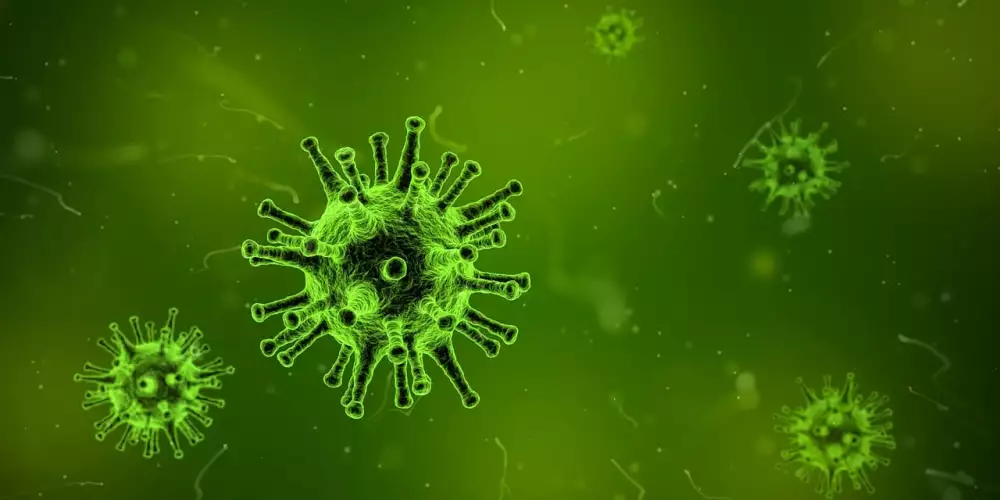Rotavirus: the dangerous diarrhea and vomiting epidemic you need to know

- What are rotaviruses
- Symptoms of rotavirus infection
- Methods of spread of rotavirus infection
- Who is most at risk of rotavirus infection
- Prevention of rotavirus infections
- Diagnosis and treatment of rotavirus infection
- Complications associated with rotavirus infection
- How to protect yourself from rotavirus infections at home
- Rotavirus vaccination
- Recommendations for Parents about Rotavirus Infections
What are rotaviruses
Rotaviruses are small, infectious viruses that are mainly found in children under the age of five. These viruses can cause a number of health problems such as diarrhea and vomiting. Rotaviruses are commonly spread through the fecal-oral route, which means that the virus enters the body through contaminated food or water. Symptoms of rotavirus infection can last for several days and can lead to dehydration. Rotavirus can be vaccinated against and prevention is key in minimizing the spread of infection.
Symptoms of rotavirus infection
Rotavirus infections are a relatively common cause of diarrhea and vomiting in children and adults. The main symptoms include severe and frequent vomiting, diarrhea with watery stools, abdominal pain and general weakness of the body. Rotavirus infection is often spread by contact with infected persons or through contaminated food and water. Although these symptoms are usually mild and resolve on their own, it is important to note that in some individuals they can be serious and require medical intervention. Therefore, it is a good idea to take precautions and follow hygiene measures such as hand washing and careful cooking of food.
Methods of spread of rotavirus infection
Rotavirus infection is a highly contagious disease that spreads in different ways. One of the main sources is infected persons, especially children. Rotaviruses are highly resistant in the environment and can survive on the surface of a variety of objects for up to several days. Another possible source of infection is food and water that has been contaminated with rotavirus. Finally, domestic animals, especially pigs and cattle, can also spread rotavirus infection. It is therefore important to follow hygiene measures such as regular hand washing, disinfection of surfaces and other preventive measures against this disease.
Who is most at risk of rotavirus infection
Rotavirus infection mostly affects young children between 6 months and 2 years of age. These viruses are highly contagious and spread easily, especially in collective settings such as kindergartens or nurseries. Children with weakened immunity or with an inadequate supply of antibodies from the mother are at the highest risk of contracting rotavirus. In countries with poorer sanitation, rotavirus can also be a problem for older children and adults who lack hygiene skills. For this reason, basic hygiene rules such as frequent hand washing and disinfection of surfaces are essential to prevent infection.
Prevention of rotavirus infections
Rotavirus infections are a relatively common and growing problem in the healthcare system. These viruses are the main cause of diarrheal diseases in young children, but can also affect adults. Prevention of rotavirus infections is key to minimizing the risk of infection. In addition to basic hygiene measures such as regular hand washing, there is an effective vaccination strategy against rotaviruses. Vaccination is the best prevention against rotavirus infections and should be administered as recommended by the pediatrician. Other preventive measures include isolating the patient during periods of illness, disinfecting the environment and avoiding contact with sick persons to minimize the spread of the disease. It is important to protect yourself and your surroundings and to take appropriate precautions against this often painful and unpleasant infection.
Diagnosis and treatment of rotavirus infection
Rotavirus infection is caused by viruses belonging to the family Reoviridae and is a common cause of diarrhea and vomiting in children under the age of five. Various tests are used to diagnose rotavirus infection, such as the stool antigen test. Treatment includes fluid, electrolyte and nutrient supplementation, as well as prevention of dehydration. Common therapeutic options include oral rehydration solutions and non-steroidal anti-inflammatory drugs to address pain and fever. While there are some limitations to these approaches, psychological support can also provide relief for both the patient and their family.
Complications associated with rotavirus infection
Rotavirus infection is a relatively common disease that primarily affects young children. In its course, severe diarrhea and vomiting occur, which can lead to dehydration and other complications. Some individuals may experience more serious problems such as convulsions, loss of consciousness or organ failure. Especially in debilitated patients (e.g. elderly or immunocompromised people), rotavirus infection can cause serious complications and even lead to death. It is therefore very important to take preventive measures such as hygiene and vaccination against the disease.
How to protect yourself from rotavirus infections at home
Rotavirus infections are a common problem in our homes, especially in young children. To protect ourselves from these dangerous viruses, we can follow a few guidelines. The first and most important is regular hand washing. If you have a sick family member in your household, it is advisable to use disinfectant and change towels and sheets frequently. It is also a good idea to be hygienic when cooking food, especially if it is meat, to avoid the transmission of bacteria from contaminated food. Last but not least, it is also important not to underestimate the situation when an infection occurs in the home - disinfect and sanitize the environment where the virus has entered (e.g. the bathroom), use protective equipment such as gloves and a mask to prevent transmission between family members. With these precautions, we can minimize the risk of spreading rotavirus infections in our homes and protect our health and the health of our loved ones.
Rotavirus vaccination
Rotavirus vaccination is becoming an increasingly common practice in the prevention of diarrhea and vomiting associated with these viruses. Rotaviruses are responsible for a large number of hospitalizations in children worldwide, especially in the very young. Vaccination helps reduce the risk of infection and can lead to lower health costs for families and the health care system. Many countries already recommend rotavirus vaccination as part of the standard of care for children. If you are interested in vaccinating your child, contact your pediatrician or doctor for more information and a specific vaccination schedule.
Recommendations for Parents about Rotavirus Infections
Recommendations for parents regarding rotavirus infections is an important topic, especially during infancy. Rotaviruses are highly contagious and common viruses causing diarrhea and vomiting in young children. To prevent the spread of this infection, basic hygiene measures such as frequent hand washing or disinfecting toys and surfaces are essential.
Other recommendations include limiting contact with sick people, especially during the disease season. In addition, parents should carefully monitor their children's symptoms and seek medical attention as soon as possible if a rotavirus infection is suspected.
In addition, there is a rotavirus vaccination available in home medicine. A medical professional can advise on the type of vaccine and its correct use.
All of these recommendations will help minimize the risk of contracting rotavirus and help protect the health of the child and the entire family.
In conclusion, rotaviruses are among the very dangerous viruses that cause diarrhea and vomiting. It is important to follow good hygiene habits and protect yourself from these viruses, especially when it comes to children and people with weakened immune systems. There is a vaccine against rotavirus that can be very effective in preventing infection. If a rotavirus infection is suspected, it is important to seek medical attention and not to underestimate the seriousness of the disease.
Published: 14. 10. 2023
Category: health




